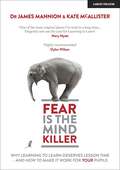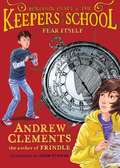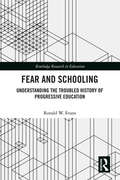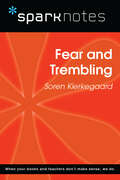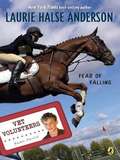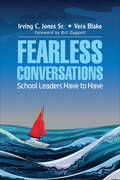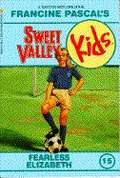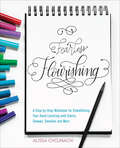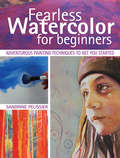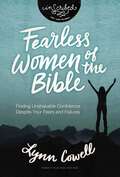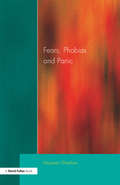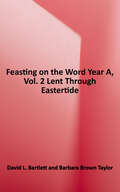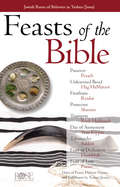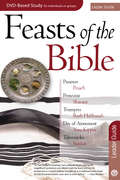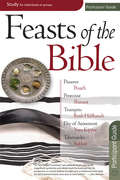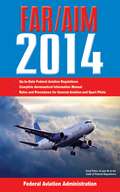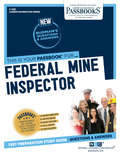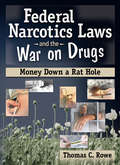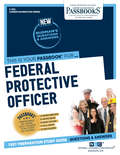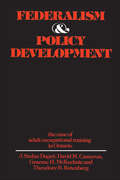- Table View
- List View
Fay and the Jay (Word Family Readers)
by Liza CharlesworthOne-day Fay meets a jay and the two play at a bay, in a book that teaches "-ay" words to young readers.
Fear Is The Mind Killer: Why Learning to Learn deserves lesson time - and how to make it work for your pupils
by James Mannion Kate McAllisterFor the last eight years, James and Kate have been working together to design, implement and evaluate a whole-school, evidence-informed approach to teaching and learning known as Learning Skills. An eight-year study with the University of Cambridge revealed that Learning Skills led to significant gains in subject learning, with rapid gains among students from disadvantaged backgrounds. In this practical guide for teachers and school leaders, James and Kate reveal a recipe for success rooted in three key concepts: metacognition (reflecting on learning); self-regulation (taking ownership over the learning process); and oracy (developing high-quality speaking and listening skills). This is a book about what happened when a small team of teachers seized an opportunity to provide their students with the knowledge, the skills and the confidence to take control of their own learning. This journey began with a question: how and what would we teach, if there was no one watching? On the other side of fear is the teacher you want to be, and the children you'd like to teach...
Fear Is The Mind Killer: Why Learning to Learn deserves lesson time - and how to make it work for your pupils
by James Mannion Kate McAllisterFor the last eight years, James and Kate have been working together to design, implement and evaluate a whole-school, evidence-informed approach to teaching and learning known as Learning Skills. An eight-year study with the University of Cambridge revealed that Learning Skills led to significant gains in subject learning, with rapid gains among students from disadvantaged backgrounds. In this practical guide for teachers and school leaders, James and Kate reveal a recipe for success rooted in three key concepts: metacognition (reflecting on learning); self-regulation (taking ownership over the learning process); and oracy (developing high-quality speaking and listening skills). This is a book about what happened when a small team of teachers seized an opportunity to provide their students with the knowledge, the skills and the confidence to take control of their own learning. This journey began with a question: how and what would we teach, if there was no one watching? On the other side of fear is the teacher you want to be, and the children you'd like to teach...
Fear Itself: We The Children; Fear Itself; The Whites Of Their Eyes; In Harm's Way; We Hold These Truths (Benjamin Pratt and the Keepers of the School #2)
by Andrew Clements Adam StowerTime is ticking as the countdown to Ben Pratt's school's total demolition continues. Ben has been given a handful of clues that could help them save the school, but they are all written in maritime riddles. <P><P>"After five bells sound, time to sit down." <P>What the heck does that mean? It's hard to know where to begin when Ben and Jill don't even know what they are looking for. <P>All Lyman, the snake posing as the school janitor, needs to know, though, is that they are looking, and that could mean the end of the 30-million-dollar development deal that pays his salary. (Which, by the way, is MUCH larger than what a typical janitor makes.) <P>As Lyman lurks in the shadows--and sometimes not in the shadows--Ben and Jill have to add another to-do to their list of things to accomplish in the next twenty-one days: (1) Figure out the clues left by past Keepers of the School groups, (2) figure out how these clues will help them save the school, and (3) stay one step ahead of Lyman. That's the mission...which seems, at times, impossible. <P>The second book in this riveting and mysterious six-book series is as action-packed as the first one, culminating in a faceoff between Ben, Jill, and Lyman. "After five bells sound, time to sit down" makes for a good riddle, but Ben and Jill also knows when it's time to stand up...for Oakes School and for themselves. <P><b>Lexile: 800L</b>
Fear and Schooling: Understanding the Troubled History of Progressive Education (Routledge Research in Education)
by Ronald EvansBy exploring the tensions, impacts, and origins of major controversies relating to schooling and curricula since the early twentieth century, this insightful text illustrates how fear has played a key role in steering the development of education in the United States. Through rigorous historical investigation, Evans demonstrates how numerous public disputes over specific curricular content have been driven by broader societal hopes and fears. Illustrating how the population’s concerns have been historically projected onto American schooling, the text posits educational debate and controversy as a means by which we struggle over changing anxieties and competing visions of the future, and in doing so, limit influence of key progressive initiatives. Episodes examined include the Rugg textbook controversy, the 1950s "crisis" over progressive education, the MACOS dispute, conservative restoration, culture war battles, and corporate school reform. In examining specific periods of intense controversy, and drawing on previously untapped archival sources, the author identifies patterns and discontinuities and explains the origins, development, and results of each case. Ultimately, this volume powerfully reveals the danger that fear-based controversies pose to hopes for democratic education. This informative and insightful text will be of interest to graduate and postgraduate students, researchers, and academics in the fields of educational reform, history of education, curriculum studies, and sociology of education.
Fear and Trembling (SparkNotes Philosophy Guide)
by SparkNotesFear and Trembling (SparkNotes Philosophy Guide) Making the reading experience fun! SparkNotes Philosophy Guides are one-stop guides to the great works of philosophy–masterpieces that stand at the foundations of Western thought. Inside each Philosophy Guide you&’ll find insightful overviews of great philosophical works of the Western world.
Fear of Falling #9
by Laurie AndersonDavid is determined to learn to jump on horseback if it kills him. And sometimes he's afraid it might, like when Comet balks and won't go over the crossbar. Now that David's father is back in town, he's promised to teach David how to jump like a champion. But David can't let him know how scared he is. Because there's one thing that scares David more than falling off a horse, and that's disappointing his father. Can he overcome his fear, or even talk about it?
Fearless Conversations School Leaders Have to Have: Step Out of Your Comfort Zone and Really Help Kids
by Dr Irving C. Jones Dr Vera J. BlakeStep out of Your Comfort Zone and Really Help Kids To meet the needs of today’s learners, fearless leadership is required to support and empower the adults who work with these learners. Written to help leaders build a culture of learning and improve academic achievement for all students, this guide to recognizing and using strategies will encourage staff to work at their full potential, build trust, and strengthen collegiality. Readers will find • interviews and case studies to illustrate effective practice • strategies to help them move from traditional methodologies toward stronger transformational leadership • examples to ignite additional thinking to facilitate achievement for all students
Fearless Conversations School Leaders Have to Have: Step Out of Your Comfort Zone and Really Help Kids
by Dr Irving C. Jones Dr Vera J. BlakeStep out of Your Comfort Zone and Really Help Kids To meet the needs of today’s learners, fearless leadership is required to support and empower the adults who work with these learners. Written to help leaders build a culture of learning and improve academic achievement for all students, this guide to recognizing and using strategies will encourage staff to work at their full potential, build trust, and strengthen collegiality. Readers will find • interviews and case studies to illustrate effective practice • strategies to help them move from traditional methodologies toward stronger transformational leadership • examples to ignite additional thinking to facilitate achievement for all students
Fearless Elizabeth (Sweet Valley Kids #15)
by Molly Mia StewartElizabeth Wakefield can't wait to try out for the Sweet Valley Soccer League. She and her friend Eva practice every afternoon, and Elizabeth's brother, Steven, gives them tips. But there's only one thing that's bothering Elizabeth. Once when she was playing goalie, she was hit with the ball. Now she's afraid the same thing will happen again. How will Elizabeth overcome her fear before the big tryouts?
Fearless Flourishing: A Step-by-Step Workbook for Embellishing Your Hand Lettering with Swirls, Swoops, Swashes and More
by Alissa ChojnackiTake your lettering to the next level with beautiful, stylish flourishes. You&’ve mastered every letter, from capital A to lowercase z. Now you want your hand-drawn projects to have the ornate and extravagant look that is only achieved through flourishing. Whether you go for a delicate, stately, whimsical, bold, funky, or elegant look, flourishing is a wonderful way to develop a personal style and make your hand-lettering stand out. From basic theories and helpful practices to beautiful examples and complex compositions, this step-by-step workbook provides all the tools you need to flourish with confidence!• Elegant Letter Embellishments • Fanciful Flourishes & Filigree • Decorative Borders & Frames• Stylish Artistic Elements
Fearless Watercolor for Beginners: Adventurous Painting Techniques to Get You Started
by Sandrine PelissierFinally! Artful watercolor painting for beginners! Yes, YOU can do it. YOU can create beautiful watercolor paintings--everything from florals to portraits to landscapes--even if you've never before worked with this exuberant, exciting medium. Fearless Watercolor for Beginners offers a unique, one-on-one workshop--with step-by-step demonstrations, exercises and bonus video content--that teaches you all the basics you need to get started (and then some)--and then promptly encourages you to break them! Inside you'll find: 22 step-by-step demonstrations for basic techniques, techniques for adding texture, and mixed-media techniques for truly one-of-a-kind work Dozens of easy-to-understand concepts, practical, meaningful tips and fun ideas you'll be eager to try Links to exclusive demo videos, exercises and tools to round out and enhance your workshop experience Be bold! Be daring! Be FEARLESS!
Fearless Women of the Bible: Finding Unshakable Confidence Despite Your Fears and Failures (InScribed Collection)
by Lynn CowellHow to Live in Bold ConfidenceHave you ever needed confidence in a specific circumstance and couldn&’t think of an example of anyone who had &“been there, overcome that&”?Author and speaker Lynn Cowell took every form of insecurity we experience as women and asked God to reveal how we should respond. The result is this in-depth, six-week Bible study spanning obscure and recognizable women in Scripture who demonstrate unshakable confidence no matter their circumstances.This six-week study will help you to:Stand with resolve when your confidence faces adversity—Women of ExodusStep out in your own defense when your confidence is challenged— The Daughters of ZRemain faithful when your confidence in God is elusive—RahabFocus on what is true when your confidence in relationships is questioned— Abigail & MichalTrust when your confidence is in doubt—Martha & MaryIncludes biblical and historical background insights, practical application, and a memory verse for each chapter. This study may be completed individually or with a small group.
Fearon's Careers
by Marna OwenThis book is for people who want to create their own great careers--careers that are just right for them. Fearon's Careers will introduce you to a career-planning process. As you work through this process, you'll discover important things about the world and about yourself. You will also learn and practice skills to prepare you for finding work that is right for you. Once you learn these skills, you will be able to practice them again and again throughout your life as you and the world change.
Fearon's World History (2nd edition)
by Joanne SuterBy the time you finish this book you will have some idea of how the world came to be the way it is today. Chapter by chapter you will learn about the rise and fall of many nations, the ideas of the great thinkers, and the incredible richness of many cultures. You will be able to name important people in history and the times in which they lived. You will learn how geography has affected the history of nations and how scientific discovery has affected the history of the whole world. geography has affected the history of nations and how scientific discovery has affected the history of the whole world
Fears, Phobias and Panic: Self-help Guide to Agoraphobia
by Maureen J. SheehanFirst Published in 1988. Routledge is an imprint of Taylor & Francis, an informa company.
Feasting On the Word: Preaching the Revised Common Lectionary, Year A, Volume 2 (Feasting On The Word Ser.)
by Barbara Brown Taylor David L. BartlettWith the twelve-volume series Feasting on the Word, Westminster John Knox Press offers one of the most extensive and well-respected resources for preaching on the market today. When complete, the twelve volumes will cover all of the Sundays in the three-year lectionary cycle, along with moveable occasions. The page layout is truly unique. For each lectionary text, preachers will find brief essays--one each on the exegetical, theological, pastoral, and homiletical challenges of the text. Each volume will also contain an index of biblical passages so that non lectionary preachers may make use of its contents. The printed volumes for Ordinary Time include the complementary stream during Year A, the complementary stream during the first half of Year B, the semicontinuous stream during the second half of Year B, and the semicontinuous stream during Year C. Beginning with the season after Pentecost in Year C, the alternate lections for Ordinary Time not in the print volumes will be available online at feastingontheword.net.
Feasts & Holidays of Bible
by Rose PublishingFeasts of the Bible - Jewish Roots of Believers in Yeshua (Jesus)Throughout the Old Testament, God commanded the children of Israel to observe his holy days (holidays) to remember the mighty things that he had done in the lives of Israel's forefathers. The Feasts of the Bible ebook celebrates and explains the meaning behind the different feasts and why they are important to God. Feasts of the Bible contains an easy-to-read chart that provides each holiday's name, explanation, date of observance, and symbolic meaning pointing to Jesus as the promised Messiah.Why should you learn about the Hebrew roots of Christianity? As a Jew, Jesus celebrated these feasts and holidays each year. The ebook is an excellent tool to learn about the Jewish roots of Christianity and to discover Yeshua, "Jesus," in each "holy day." The ebook shows the Hebrew name, spelling, pronunciation, symbolism of Jesus, Bible references, and New Testament fulfillment for each of God's appointed feasts: *Passover (Pesach) *Unleavened Bread (Hag HaMatzot) *Firstfruits (Yom HaBikkurim) *Feast of Weeks or Pentecost (Shavuot) *Feast of Trumpets or Rosh HaShanah (New Year) *Day of Atonement or Yom Kippur *Tabernacles or Sukkot (Feast of Booths) *Rejoicing in the Law or Torah (Simchat) *Feast of Dedication or Hanukkah (Chanukah or Feast of Lights) *Feast of Lots or Purim The Feasts of the Bible ebook provides important insights into the works of God on behalf of his chosen people. Feasts of the Bible is a celebration of the rich and meaningful heritage given to believers through Christ. The ebook reveals insightful and historical facts about each of the holidays; for example - *Passover: A hymn is usually sung at the end of the Passover service, as was the case with Jesus and his disciples during the Last Supper (Matthew 26:30). *During the Rosh HaShanah synagogue services, the shofar (ram's horn) is blown 100 times. *Hanukkah is known as the Feast of Lights or the Feast of Dedication because of a legendary miraculous provision of oil for the eternal light in the Temple. *Purim marks the deliverance of the Jews through Queen Esther. Feasts of the Bible also includes additional fascinating facts about the feasts of the Bible; for instance: *Leviticus 23 is sometimes called "God's calendar of redeeming grace" because the 44 verses tell of God's redemptive plan. *God told Moses that seven of the feasts were to be "appointed feasts of the Lord" and were to be proclaimed as sacred assemblies (Leviticus 23:1 & 2). *Three of the feasts were pilgrimage feasts. Feasts of the Bible is a fantastic teaching tool for churches and groups who want to explore their Jewish heritage found in Christ. Believers will also find the observance of the feasts and holidays as a meaningful way to add depth to their devotion to God. There's a small group DVD-based curriculum to go with this pamphlet. Click here (or go to FeastsOfTheBible.com) to see sample videos, sample sessions from the leader and participant guides, and to find out more about the Feasts of the Bible DVD-based study.*September 4, 2013 - RoshHaShana (Jewish New Year)*September 13-14, 2013- Yom Kippur*September 18, 2013 - Sukkot
Feasts of the Bible Leader Guide
by Sam NadlerThis is the companion leader guide to the Feasts of the Bible 6-Session DVD-based Study.It gives the leader everything needed to host this fascinating topic as a Sunday school class, small group, or home fellowship.Leading this study is easy, because all of the teaching is done by Dr. Sam Nadler, the presenter on the DVD. The Leader Guide contains tips for opening each session, how much time to spend on each part of the discussion, additional Old Testament information about types of offerings, the role of the priests, the meaning of Jesus' teaching that he was "Lord of the Sabbath," and Frequently Asked Questions. Includes discussion questions, quizzes, a place to list prayer requests, a calendar of the feasts (they change dates each year) and diagrams and charts for the tabernacle and the feasts of the Lord.Some Christians miss the importance of the biblical feasts, seeing them as merely ""Jewish"" holidays, but Scripture says these are the Feasts of the Lord God established for all people for all time. Now you can connect the Hebrew roots of Christianity and the symbolism that points to Jesus Christ using this6-session DVD-based study, The Feasts of the Bible. This is the ultimate 6-session DVD-based study on the feasts and holidays of the Bible. Dr. Sam Nadler is your guide through the feasts. Brought up in a traditional Jewish home, Sam came to believe in Jesus as Messiah. He served with Jews for Jesus, Chosen People Ministries, and is now president of Word of Messiah Ministries.
Feasts of the Bible Participant Guide
by Sam NadlerThis is the companion participant guide to the Feasts of the Bible 6-Session DVD-based Study.It gives the participant discussion questions, quizzes, a place for taking notes and listing prayer requests, additional Old Testament information about types of offerings, the role of the priests, the meaning of Jesus' teaching that he was "Lord of the Sabbath," and more. Includes a calendar of the feasts (they change dates each year) and diagrams and charts for the tabernacle and the feasts of the Lord.Some Christians miss the importance of the biblical feasts, seeing them as merely "Jewish" holidays, but Scripture says these are the Feasts of the Lord God established for all people for all time. Now you can connect the Hebrew roots of Christianity and the symbolism that points to Jesus Christ using this6-session DVD-based study and Participation Guide, The Feasts of the Bible, sold seperately.
Federal Aviation Regulations/Aeronautical Information Manual 2014: Federal Aviation Regulations/aeronautical Information Manual (Far/aim: Federal Aviation Regulations And The Aeronautical Information Manual Ser.)
by Federal Aviation AdministrationIf you’re an aviator or aviation enthusiast, you cannot be caught with an out-of-date edition of the FAR/AIM. In today’s environment, there is no excuse for ignorance of the rules of the US airspace system. In the newest edition of the FAR/AIM, all regulations, procedures, and illustrations are brought up to date to reflect current FAA data. This handy reference book is an indispensable resource for members of the aviation community, as well as for aspiring pilots looking to get a solid background in the rules, requirements, and procedures of flight training. Not only does this manual present all the current FAA regulations, it also includes: A study guide for specific pilot training certifications and ratings A pilot/controller glossary Standard instrument procedures Parachute operations Airworthiness standards for products and parts The NASA Aviation Safety reporting form Important FAA contact informationThis is the most complete guide to the rules of aviation available anywhere. Don’t take off without the FAR/AIM!
Federal Mine Inspector: Passbooks Study Guide (Career Examination Series)
by National Learning CorporationThe Federal Mine Inspector Passbook® prepares you for your test by allowing you to take practice exams in the subjects you need to study. It provides hundreds of questions and answers in the areas that will likely be covered on your upcoming exam, including but not limited to: Fundamentals of mining, drilling and subsurface conditions; inspection techniques; safety and report writing.
Federal Narcotics Laws and the War on Drugs: Money Down a Rat Hole
by Thomas C RoweWe&’re losing the "war on drugs"-but the fight isn&’t over yetFederal Narcotics Laws and the War on Drugs examines our current anti-drug programs and policies, explains why they have failed, and presents a plan to fix them. Author Thomas C. Rowe, who has been educating college students on recreational drug use for nearly 30 years, exposes the truth about anti-drug programs he believes were conceived in ignorance of the drugs themselves and motivated by racial/cultural bias. This powerful book advocates a shift in federal spending to move funds away from the failed elements of the "war on drugs" toward policies with a more realistic chance to succeed-the drug courts, education, and effective treatment. Common myths and misconceptions about drugs have produced anti-drug programs that don&’t work, won&’t work, and waste millions of dollars. Federal Narcotics Laws and the War on Drugs looks at how-and why-this has happened and what can be done to correct it. The book is divided into "How did we get into this mess?" which details the history of anti-narcotic legislation, how drug agencies evolved, and the role played by Harry Anslinger, Commissioner of the United States Bureau of Narcotics from 1930 to 1962; "What works and what doesn&’t work," which looks at the failure of interdiction efforts and the negative consequences that have resulted with a particular focus on the problems of prisons balanced against the drug court system; and a third section that serves as an overview of various recreational drugs, considers arguments for and against drug legalization, and offers suggestions for more effective methods than our current system allows.Federal Narcotics Laws and the War on Drugs also examines: the creation of the Federal Bureau of Narcotics current regulations and structures current federal sentencing guidelines current state of the courts and the prison system mandatory sentencing and what judges think interdiction for heroin, cocaine and crack cocaine, and marijuana early education efforts the DARE program drug use trends drug treatment models the debate over legalizationFederal Narcotics Laws and the War on Drugs also includes several appendices of federal budget figures, cocaine and heroin purity and price, and federal bureau of prisons statistics. This unique book is required reading for anyone concerned about the drug problem in the United States and what is-and isn&’t-being done to correct it.
Federal Protective Officer: Passbooks Study Guide (Career Examination Series)
by National Learning CorporationThe Federal Protective Officer Passbook® prepares you for your test by allowing you to take practice exams in the subjects you need to study. It provides hundreds of questions and answers in the areas that will likely be covered on your upcoming exam.
Federalism and Policy Development: The Case of Adult Occupational Training in Ontario
by David Cameron Graeme Mckechnie J. Stefan Dupre Theodore RotenbergIn 1966 the Canadian government announced the abrupt termination of a longstanding conditional grant relationship with the provinces in the domain of technical and vocational education. It sought to substitute a radically new arrangement whereby it would purchase occupational training for adults as an integral part of an over-all manpower policy. This book examines what ensued with particular reference to the province of Ontario and offers unique insights into the conduct of federal-provincial relations from the level of first ministers through that of operating officials down to the grass roots of individual Canadian communities. It also assesses the opportunities and limitations attendant upon a major departure in manpower policy. By focusing on the role of public servants with quite distinct professional orientations – economists and educationists – the book yields new insights into the contribution of appointed specialists to policy development.

